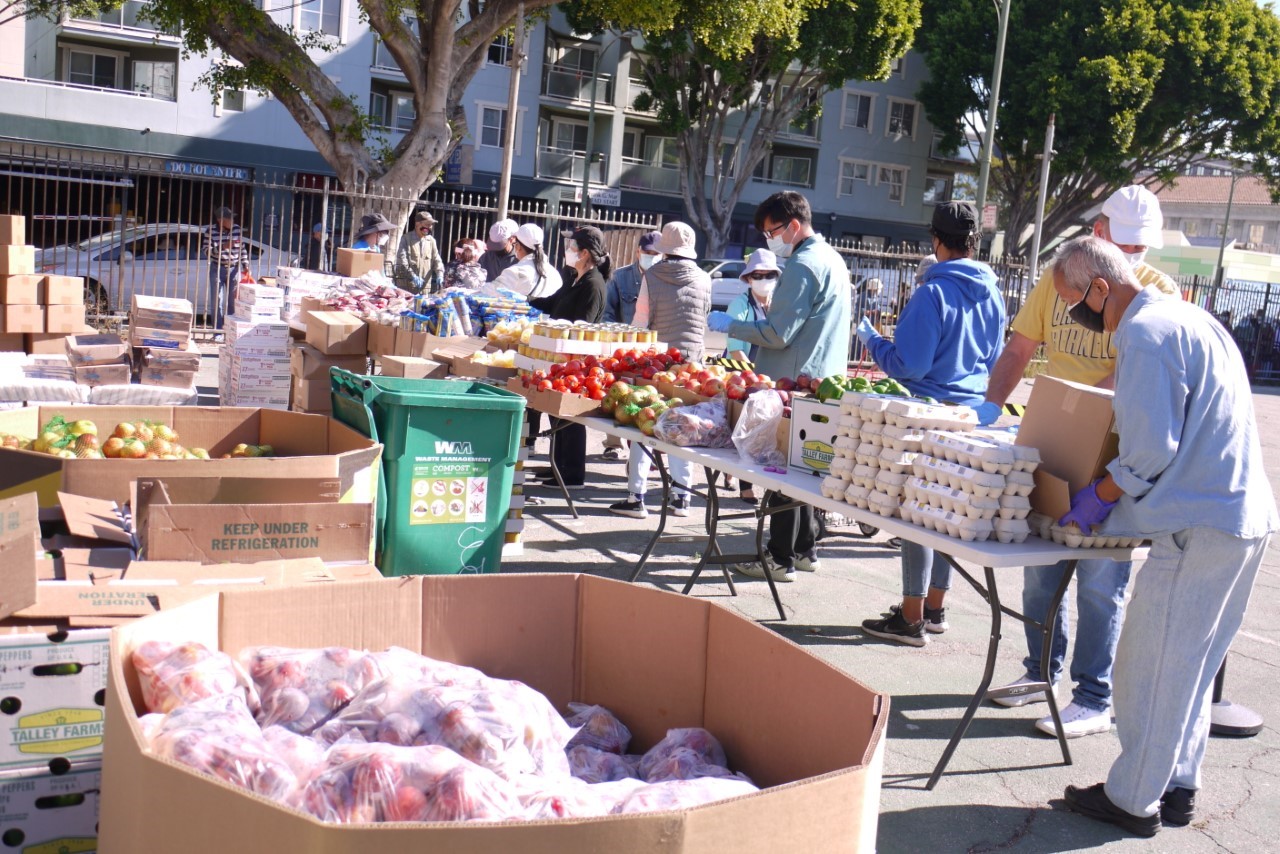EBALDC Food Distribution Program for Low-Income Chinatown Residents Bridges Food Insecurity Gap
 EBALDC residents picking up necessities at food distribution in Oakland’s Chinatown.
Photo credit: Fuan Ou
EBALDC residents picking up necessities at food distribution in Oakland’s Chinatown.
Photo credit: Fuan Ou “What has really made our food distribution program a success has been our volunteer seniors making door to door deliveries to their neighbors – seniors helping seniors. I am so thankful for the many hours they have worked with me side by side for the last couple of years.”
— Lily Hu, EBALDC’s Chinatown Resident Services Manager
First the COVID pandemic had people afraid to go out to the store. Then supply chain disruptions started driving up food prices and now inflation makes everything cost a lot more. For EBALDC’s Resident Services staff this is a day-to-day issue that hasn’t gone away and for our Chinatown properties an entire food program has sprung up to handle the need.
On the forefront working directly with our residents, Lily Hu is EBALDC’s Chinatown Resident Services Manager who makes the Healthy Neighborhood Approach a reality for seven neighborhood properties. She knew right away that food scarcity would be an issue at the beginning of the pandemic in part because Chinatown had no access to other food distribution programs at the time.

Lily Hu checks the delivery from EBALDC Food Program partner Alameda County Community Food Bank. Photo credit: Fuan Ou
“We started providing food at our Noble Tower senior residence right after COVID started,” said Lily. “We never had a food program before, and we were fortunate to find a partner in Mercy Brown Bags. We were able, and continue to provide today, two grocery deliveries a month.”
Later in 2020, Lily and her team were able to expand door to door deliveries to Madison Park Apartments and in 2021 EBALDC developed another partnership, this time with Alameda County Community Food Bank. Now, each unit in EBALDC’s seven Chinatown properties is given a food ticket that enables our residents access to a twice a month grocery giveaway in a 12th Street parking lot in downtown Oakland. Altogether, the program is run by a staff of four along with 17 volunteers, many of whom are senior residents living in our Chinatown buildings.
“Even after COVID, the need is still huge for food among residents in our EBALDC buildings. Residents line up at our outdoor food site sometimes starting as early as 6 am. All because of food inflation,” says Lily. “Another thing,” she continues, “the State CalFresh food stamp program has been cut back. The supplement is ending but food prices remain the same. We are hoping is to extend the food program into the future and to other sites through the securing of more grants.”

Since the early days of the COVID pandemic Mercy Brown Bag has been a key partner in EBALDC’s Food Distribution Program. Photo credit: Janny Truong
Chun Huang, a college-age resident at Frank G. Mar Community Housing, is a volunteer who began helping with the food program early on in the pandemic. “Folks were locked at. For low-income people it was especially harder to go out and shop and have interactions with others,” he noted. “I didn’t have much to do, and helping people during tough times when we were all quarantined at home was a good opportunity for me to reconnect with my neighbors.” Adding to his volunteer work, Chun recently joined EBALDC’s Board of Directors (more on that in another issue).
Says Lily, “Another goal we have, as COVID subsides, is to rebuild relationships among our residents. Not just food but partnership activities too such as community building to reestablish personal connections. We want to see our residents back out enjoying themselves again. We’re imagining a host of engaging social activities like coffee hour, games day, maybe a movie night
— the fun stuff of life that brings people together.”

Food distribution volunteer Chun Huang delivers food door to door to EBALDC residents in Chinatown.
Says Lily, “Another goal we have, as COVID subsides, is to rebuild relationships among our residents. Not just food but partnership activities too, such as community building to reestablish personal connections. We want to see our residents back out enjoying themselves again. We’re imagining a host of engaging social activities like coffee hour, games day, maybe a movie night — the fun stuff of life that brings people together.”
While Chun waits to hear if he is accepted into CAL in pursuit of architecture and construction studies, he continues to help out with the Wednesday food giveaway. Talking about working with fellow volunteers, mostly seniors, he notes, “They are just so welcoming, and they like to talk to me. I’m just there to listen and absorb and then I tell them my stories about growing up in Oakland Chinatown. It’s such a nice little bonding experience when we volunteer together to support our community.”
